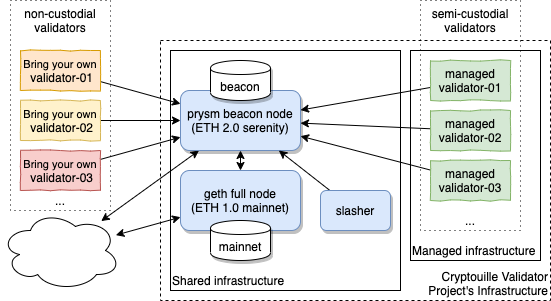The Cryptouille Validator Project
ETH 2.0 is a major evolution in the Ethereum ecosystem, and we strongly believe in this evolution.
The ultimate goal of the Cryptouille Validator Project is to allow anyone believes in ETH 2.0 to join the game, without depending on the monopole of the main exchanges. This way more diversity towards ETH network is guarantee, as well as diversity in stakers.
In order to achieve this objective, Cryptouille Validator Project provides shared ETH 1.0 and ETH 2.0 full nodes, and allows anyone participating in the project to connect a validator to these full nodes. If you have any IT competencies you can run your own validator (bring your own validator, or BYO validator in short), or you can only bring your 32 ETH benefit from the hassle-free managed validator.

Managed Validator - semi-custodial option
Managed validators allow you to stake your ETH without much IT skills. The Cryptouille Validator Project runs and manages the required hardware and software to run smoothly the validator. Stake your ETH, share your validator key and you're good to go!
Bring-your-own Validator - non-custodial option
If you have more IT skills, you can run your own validator and connect it to the Cryptouille Validator Project shared full nodes. Stake your ETH, keep your keys safe, install your validator, and you're good to go!
Security of your staked ETH
When questioning the security of your stake, it's important to mention that ETH by design decoupled staking in validation and withdrawal. This materializes in generating two keys, one for validation only and one for withdrawal only.
As long as you're not sharing/disclosing your withdrawal key, no one can steal the 32 ETH you staked.
Validator-as-a-service products are hence classified in three categories:
- non-custodial, when you share no keys. This is our bring-your-own validator approach
- semi-custodial, when you only share the validation key. This is our managed validator approach
- custodial, when you share both keys. We don't have such an approach we highly discourage (and even question) using services where you need to share both keys.